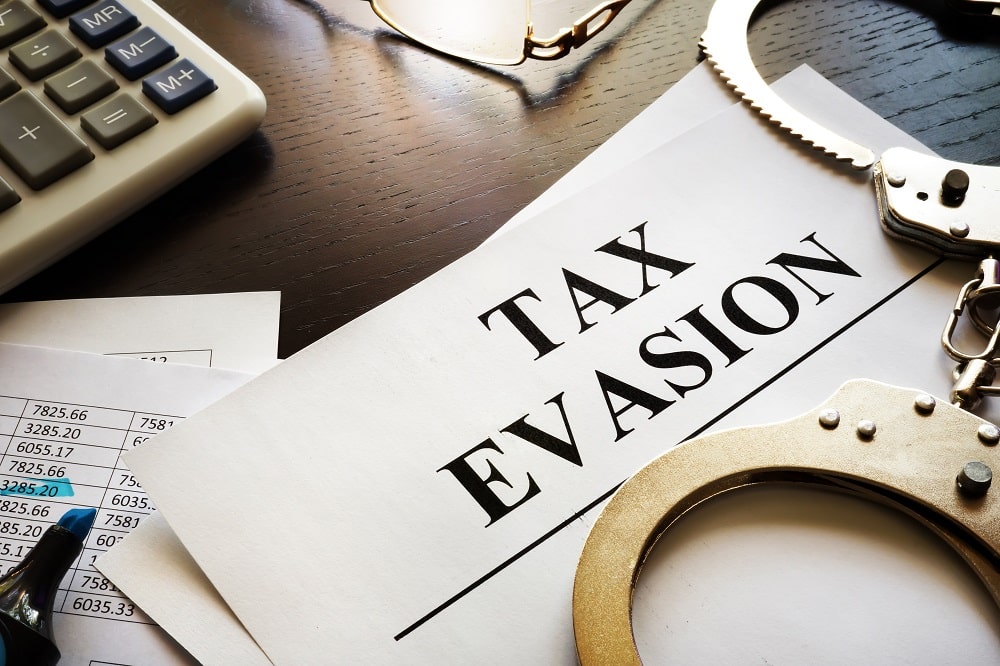
The United States tax system is infamously complicated. For those looking to learn more about the tax system and the rules that are involved, a common source of confusion is the difference between tax evasion and tax fraud. Luckily, our comprehensive knowledge base will help you learn more about the rules of the tax system and more specifically, provide you with a detailed account of the differences between tax evasion and tax fraud.
Not only will this knowledge help you gain a deeper understanding of the tax system, but it will also help to protect you from incurring fees and penalties from the IRS as a result of unknowingly breaking the complicated and far-reaching rules of the tax system. We’re going to cover the definition of both tax evasion and tax fraud as well as the key differences between the two concepts.
What is Tax Fraud?
Tax fraud is the process of illegally falsifying records or misrepresenting records in an attempt to limit the amount of tax that you are liable to pay. It’s important to understand that this is a deliberate attempt to defraud the government by using records incorrectly. The tax liability of an organization or individual is determined based on their income for the year. There are various ways that some people could try to commit fraud.
The most common way that a person commits tax fraud is they use inappropriate records during the calculation of their tax obligation. A good example would be if a business owner records personal expenses as business expenses in the attempt to lower the amount of taxes that they will have to pay for the business’ income. This could be anything ranging from the purchase of equipment and electronics to buying gasoline for personal use on the business credit card.
Consequences of Tax Fraud
It can be somewhat difficult for the IRS to prove that you have committed tax fraud, but once they do, the consequences can be harsh and swift. The US government does not take lightly people and businesses not paying what they owe in taxes. The consequences of tax fraud are wide-ranging and can be as minor as having to pay a fee and as severe as serving years in prison. The punishment typically depends on how severe the offense is.
What is Tax Evasion?
Tax evasion is another criminal offense that occurs rather often. Instead of being strictly about the calculation of owed taxes, such as the case with tax fraud, tax evasion has a more broad definition that has to do with refusing to pay what is owed. This means that when a tax bill comes due, the person or business that owes taxes to the IRS has either willingly ignored it, refused to pay it, or has taken other action that indicates they have no intention of paying the bill.
The important thing to remember about tax evasion is that it is a deliberate attempt to not pay the taxes that are owed. To prove someone guilty of tax evasion, the IRS must prove that the person or business saw and acknowledged the tax bill, but refused to pay it.
Consequences of Tax Evasion
Like tax fraud, the consequences of tax evasion for people or businesses can be severe. The IRS will fervently pursue those that have committed tax evasion and tax fraud. Typically, the severity of the punishment for this offense is directly tied to the extent of the crime. For some offenses, you may just have to pay a fine. For others, you may have your wages or income garnished. For extreme cases, a prison sentence is certainly possible.
Key Differences Between Tax Evasion and Tax Fraud
If you want to be sure that you are compliant with all rules and regulations having to do with tax evasion and tax fraud, you will need to be familiar with the key differences. To the everyday person, tax evasion and tax fraud may be interchangeable in conversation. However, they are two completely different concepts.
The key difference between tax evasion and tax fraud is that one involved committing fraud when it comes to the calculation of tax liability, while the other one has to do with refusing to pay what you owe for taxes. The distinction here is clear. Though these offenses do have some key differences, the consequences for them are somewhat similar, with the range of possibilities stretching from small fines to years of prison time.
How to Avoid Tax Fraud
If you want to avoid the consequences that come along with tax fraud, and trust us, you do, the best thing that you can do is to hire us to handle your tax situation. One of the most common sources of fraud and inaccuracy in reporting comes from the inexperience of people that are filing their own taxes.
When you don’t quite know what you are doing, it’s very possible that you make a mistake or mistakenly believe that you are filing correctly. However, this can lead to severe consequences. It will require working with our tax professionals, but businesses and individuals around the world find this investment well worth it. The benefits of hiring us are that you could save time and money by working with an expert that knows what they are doing.
Another thing that you can do if you want to avoid being accused of tax fraud by the IRS is that you can ensure you have a comprehensive records-keeping system that tracks everything accurately. This will prevent personal expenses from being recorded as business expenses, for example.
How to Avoid Tax Evasion
When it comes to tax evasion, the solution is simple. You need to ensure that you or your business pays taxes in full and on-time. You can discuss your options with our team and come up with a plan to tackle the amount owed.
Getting the Help You Deserve With Your Taxes & Tax Debt
It is never a good idea to approach complex financial decisions without sound advice from people who really understand the choices you’re weighing. That is why tax professionals are there, to give you the resources to reach the best possible understanding with the IRS. If you have further questions regarding how to pay back taxes or file unfiled returns, contact us today by phone ((855) 749-2859) or email.

The United States tax system is infamously complicated. For those looking to learn more about the tax system and the rules that are involved, a common source of confusion is the difference between tax evasion and tax fraud. Luckily, our comprehensive knowledge base will help you learn more about the rules of the tax system and more specifically, provide you with a detailed account of the differences between tax evasion and tax fraud.
Not only will this knowledge help you gain a deeper understanding of the tax system, but it will also help to protect you from incurring fees and penalties from the IRS as a result of unknowingly breaking the complicated and far-reaching rules of the tax system. We’re going to cover the definition of both tax evasion and tax fraud as well as the key differences between the two concepts.
What is Tax Fraud?
Tax fraud is the process of illegally falsifying records or misrepresenting records in an attempt to limit the amount of tax that you are liable to pay. It’s important to understand that this is a deliberate attempt to defraud the government by using records incorrectly. The tax liability of an organization or individual is determined based on their income for the year. There are various ways that some people could try to commit fraud.
The most common way that a person commits tax fraud is they use inappropriate records during the calculation of their tax obligation. A good example would be if a business owner records personal expenses as business expenses in the attempt to lower the amount of taxes that they will have to pay for the business’ income. This could be anything ranging from the purchase of equipment and electronics to buying gasoline for personal use on the business credit card.
Consequences of Tax Fraud
It can be somewhat difficult for the IRS to prove that you have committed tax fraud, but once they do, the consequences can be harsh and swift. The US government does not take lightly people and businesses not paying what they owe in taxes. The consequences of tax fraud are wide-ranging and can be as minor as having to pay a fee and as severe as serving years in prison. The punishment typically depends on how severe the offense is.
What is Tax Evasion?
Tax evasion is another criminal offense that occurs rather often. Instead of being strictly about the calculation of owed taxes, such as the case with tax fraud, tax evasion has a more broad definition that has to do with refusing to pay what is owed. This means that when a tax bill comes due, the person or business that owes taxes to the IRS has either willingly ignored it, refused to pay it, or has taken other action that indicates they have no intention of paying the bill.
The important thing to remember about tax evasion is that it is a deliberate attempt to not pay the taxes that are owed. To prove someone guilty of tax evasion, the IRS must prove that the person or business saw and acknowledged the tax bill, but refused to pay it.
Consequences of Tax Evasion
Like tax fraud, the consequences of tax evasion for people or businesses can be severe. The IRS will fervently pursue those that have committed tax evasion and tax fraud. Typically, the severity of the punishment for this offense is directly tied to the extent of the crime. For some offenses, you may just have to pay a fine. For others, you may have your wages or income garnished. For extreme cases, a prison sentence is certainly possible.
Key Differences Between Tax Evasion and Tax Fraud
If you want to be sure that you are compliant with all rules and regulations having to do with tax evasion and tax fraud, you will need to be familiar with the key differences. To the everyday person, tax evasion and tax fraud may be interchangeable in conversation. However, they are two completely different concepts.
The key difference between tax evasion and tax fraud is that one involved committing fraud when it comes to the calculation of tax liability, while the other one has to do with refusing to pay what you owe for taxes. The distinction here is clear. Though these offenses do have some key differences, the consequences for them are somewhat similar, with the range of possibilities stretching from small fines to years of prison time.
How to Avoid Tax Fraud
If you want to avoid the consequences that come along with tax fraud, and trust us, you do, the best thing that you can do is to hire us to handle your tax situation. One of the most common sources of fraud and inaccuracy in reporting comes from the inexperience of people that are filing their own taxes.
When you don’t quite know what you are doing, it’s very possible that you make a mistake or mistakenly believe that you are filing correctly. However, this can lead to severe consequences. It will require working with our tax professionals, but businesses and individuals around the world find this investment well worth it. The benefits of hiring us are that you could save time and money by working with an expert that knows what they are doing.
Another thing that you can do if you want to avoid being accused of tax fraud by the IRS is that you can ensure you have a comprehensive records-keeping system that tracks everything accurately. This will prevent personal expenses from being recorded as business expenses, for example.
How to Avoid Tax Evasion
When it comes to tax evasion, the solution is simple. You need to ensure that you or your business pays taxes in full and on-time. You can discuss your options with our team and come up with a plan to tackle the amount owed.
Getting the Help You Deserve With Your Taxes & Tax Debt
It is never a good idea to approach complex financial decisions without sound advice from people who really understand the choices you’re weighing. That is why tax professionals are there, to give you the resources to reach the best possible understanding with the IRS. If you have further questions regarding how to pay back taxes or file unfiled returns, contact us today by phone ((855) 749-2859) or email.





